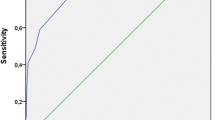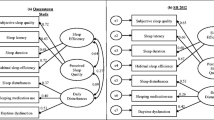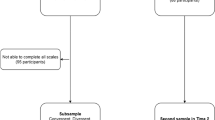Abstract
Purpose
The Pittsburgh Sleep Quality Index is used to evaluate subjective sleep quality, and it is commonly used in clinical research. Subjective sleep quality is also an important clinical measure in patients with psychiatric disorders. The aim of the present study was to evaluate the reliability and validity of the Hungarian version of the Pittsburgh Sleep Quality Index (PSQI-HUN) in both clinical and non-clinical samples.
Methods
The original version of PSQI was translated into Hungarian according to standard guidelines. The PSQI-HUN and the Athens Insomnia Scale (AIS) were subsequently administered to 53 psychiatric patients (schizophrenia, recurrent depressive disorder, mixed anxiety, and depressive disorder) and 178 healthy controls.
Results
Internal consistency as measured by Cronbach’s alpha in the whole sample was 0.79. Pearson’s product-moment correlations between component scores and the global scores were high (0.59–0.88) in the PSQI-HUN indicating the homogeneity of the scale. PSQI-HUN global and component scores differed significantly between psychiatric patients and control subjects. In the psychiatric patient subsample, schizophrenics had lower global scores compared to the other two patient groups. The analysis of convergent validity showed significant correlations between the AIS and the global as well as the component scores of the PSQI-HUN (except the component of sleep latency).
Conclusions
The present study concludes that the PSQI-HUN is a reliable, valid, and standardized measure for assessment of the subjective sleep quality in clinical and research settings.
Similar content being viewed by others
References
Buysse DJ, Reynolds CF 3rd, Monk TH, Berman SR, Kupfer DJ (1989) The Pittsburgh Sleep Quality Index: a new instrument for psychiatric practice and research. Psychiatry Res 28:193–213
Carpenter JS, Andrykowski MA (1998) Psychometric evaluation of the Pittsburgh Sleep Quality Index. J Psychosom Res 45:5–13
Doi Y, Minowa M, Uchiyama M, Okawa M, Kim K, Shibui K, Kamei Y (2000) Psychometric assessment of subjective sleep quality using the Japanese version of the Pittsburgh Sleep Quality Index (PSQI-J) in psychiatric disordered and control subjects. Psychiatry Res 97:165–172
Singh NA, Clements KM, Fiatarone MA (1997) A randomized controlled trial of the effect of exercise on sleep. Sleep 20:95–101
Harmat L, Takacs J, Bodizs R (2008) Music improves sleep quality in students. J Adv Nurs 62:327–335. doi:10.1111/j.1365-2648.2008.04602
Lai HL (2005) Self-reported napping and nocturnal sleep in Taiwanese elderly insomniacs. Public Health Nurs 22:240–247
Shochat T, Tzischinsky O, Oksenberg A, Peled R (2007) Validation of the Pittsburgh Sleep Quality Index Hebrew translation (PSQI-H) in a sleep clinic sample. Isr Med Assoc J 9:853–856
Backhaus J, Junghanns K, Broocks A, Riemann D, Hohagen F (2002) Test-retest reliability and validity of the Pittsburgh Sleep Quality Index in primary insomnia. J Psychosom Res 53:737–740
Beck AT, Ward CH, Mendelson M, Mock J, Erbaugh J (1961) An inventory for measuring depression. Arch Gen Psychiatry 4:561–571
Soldatos CR, Dikeos DG, Paparrigopoulos TJ (2000) Athens insomnia scale: validation of an instrument based on ICD-10 criteria. J Psychosom Res 48:555–560
Soldatos CR, Dikeos DG, Paparrigopoulos TJ (2003) The diagnostic validity of the Athens insomnia scale. J Psychosom Res 55:263–267
Spielberger CD (1972) Anxiety as an emotional state. In: Spielberger CD (ed) Anxiety: current trends in theory and research. Academic Press, New York, pp. 29–49
American Psychiatric Association (1994) Diagnostic and statistical manual of mental disorders: DSM-IV, 4th edn. Washington, DC
Rózsa S, Szádóczky E, Füredi J (2001) A Beck Depresszió Kérdőív rövidített változatának jellemzői hazai mintán. Psychiatr Hung 16:379–397
Spielberger CD, Gorsuch RL, Lushene R, Vagg PR, Jacobs GA (1983) Manual for state-trait anxiety inventory. Consulting Psychologists Press, Palo Alto, CA
Sipos K, Sipos M (1983) The development and validation of the Hungarian form of the state-trait anxiety inventory. Ser Clin C 2:27–39
Beck AT, Beck RW (1972) Shortened version of BDI. Post Grad Med 52:81–85
Al-Yasiri AR, AbdKarkosh YS (2013) The validity of Beck depression inventory—short version in depressed patients diagnosed according to ICD10. IPMJ 12:603–613
Novak M, Mucsi I, Shapiro CM, Rethelyi J, Kopp MS (2004) Increased utilization of health services by insomniacs—an epidemiological perspective. J Psychosom Res 56:527–536
Nunnally J, Bernstein I (1994) Psychometric theory, 3rd edn. McGraw-Hill, New York
Bertolazi AN, Fagondes SC, Hoff LS, Dartora EG, Miozzo IC, de Barba ME, Barreto SS (2011) Validation of the Brazilian Portuguese version of the Pittsburgh Sleep Quality Index. Sleep Med 12:70–75. doi:10.1016/j.sleep.2010.04.020
Moghaddam JF, Nakhaee N, Sheibani V, Garrusi B, Amirkafi A (2012) Reliability and validity of the Persian version of the Pittsburgh Sleep Quality Index (PSQI-P). Sleep Breath 16:79–82. doi:10.1007/s11325-010-0478-5
Sohn SI, Kim DH, Lee MY, Cho YW (2012) The reliability and validity of the Korean version of the Pittsburgh Sleep Quality Index. Sleep Breath 16:803–812. doi:10.1007/s11325-011-0579-9
Doi Y, Minowa M, Okawa M, Uchiyama M (2000) Prevalence of sleep disturbance and hypnotic medication use in relation to sociodemographic factors in the general Japanese adult population. J Epidemiol 10:79–86
Royuela A, Macias J, Gil-Verina J, et al. (2002) Sleep in schizophrenia: a preliminary study using the Pittsburgh Sleep Quality Index. Neurobiol Sleep Wakefulness Cycle 2:37–39
Acknowledgments
Authors gratefully acknowledge Örjan de Manzano and Miriam Mosing for their comments and proof reading on the manuscript.
Author information
Authors and Affiliations
Corresponding author
Ethics declarations
Conflict of interest
There are no potential or actual conflicts of interest.
Ethical approval
All procedures were in accordance with the ethical standards of the institutional and/or national research committee and with the 1964 Helsinki declaration and its later amendments or comparable ethical standards. The study was approved by the Human Research Ethics Committee of the study university (Semmelweis University, Budapest, Hungary, 9094–4/2013/EKZ (125/2013)). Participants received both oral and written information about the study and they signed an informed consent form.
Informed consent
Informed consent was obtained from all individual participants included in the study.
Rights and permissions
About this article
Cite this article
Takács, J., Bódizs, R., Ujma, P.P. et al. Reliability and validity of the Hungarian version of the Pittsburgh Sleep Quality Index (PSQI-HUN): comparing psychiatric patients with control subjects. Sleep Breath 20, 1045–1051 (2016). https://doi.org/10.1007/s11325-016-1347-7
Received:
Revised:
Accepted:
Published:
Issue Date:
DOI: https://doi.org/10.1007/s11325-016-1347-7




